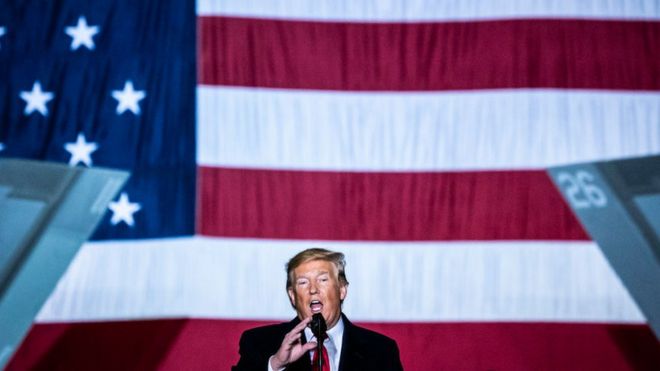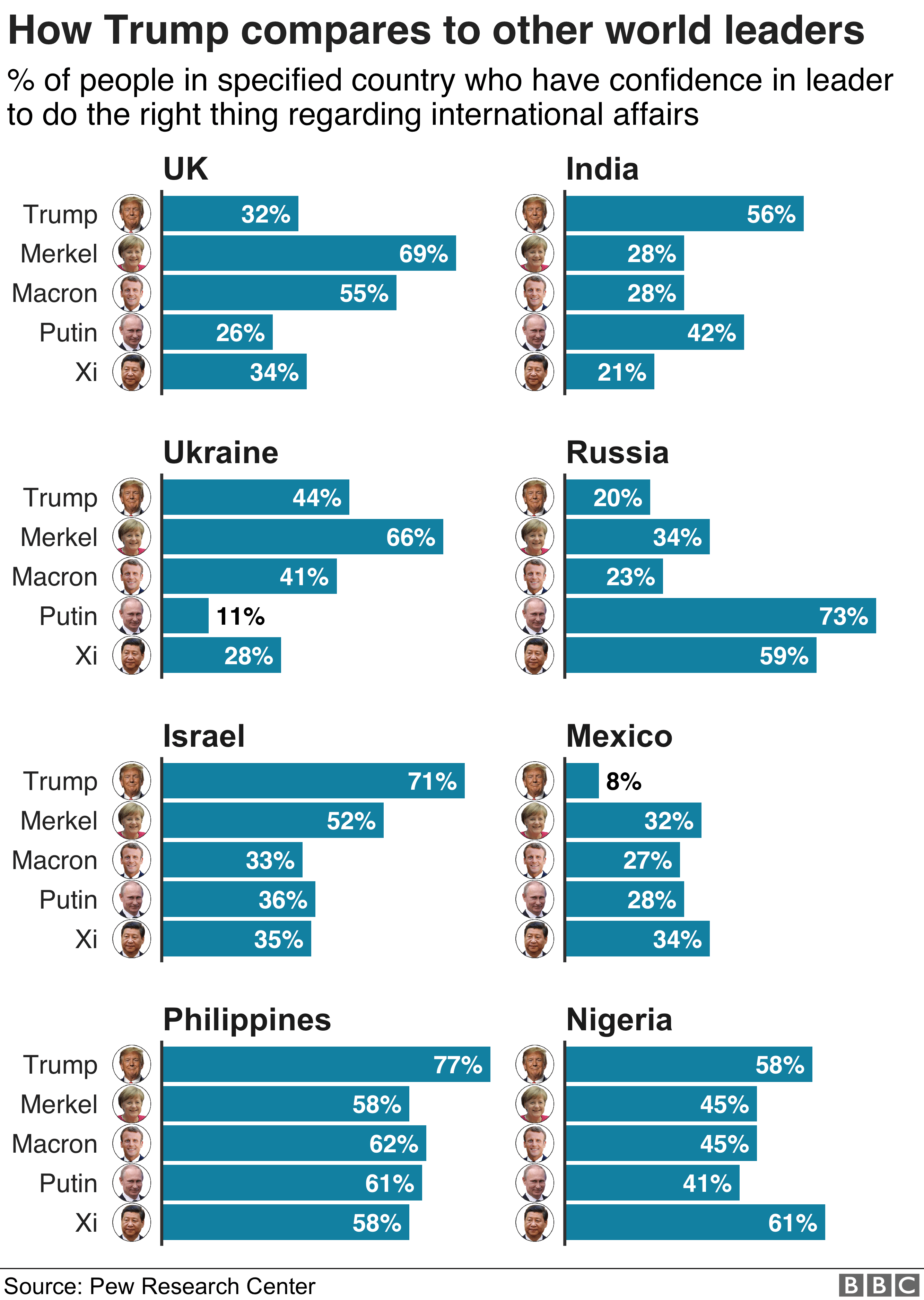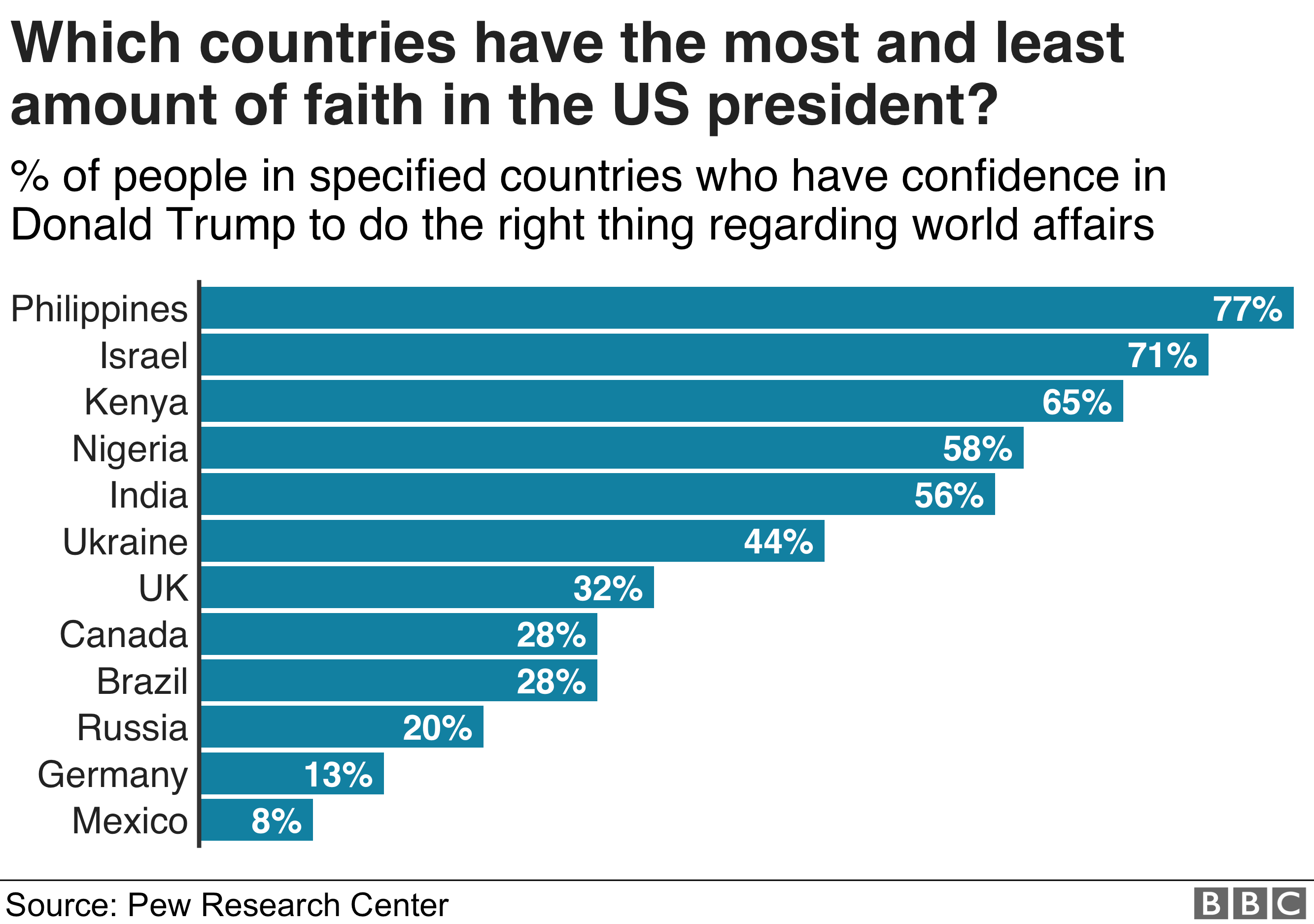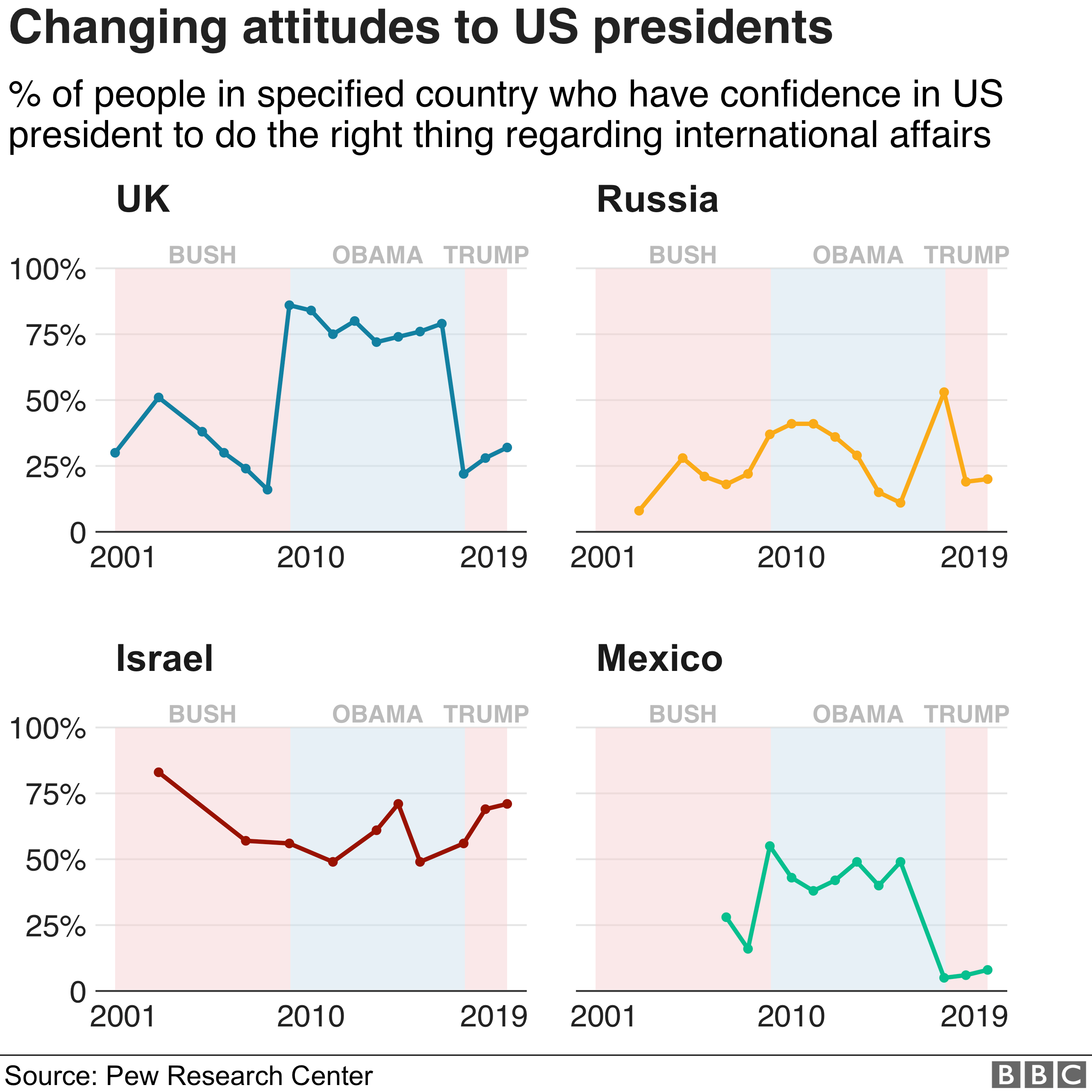A majority of Nigerians and Kenyans have confidence in President Trump, according to Pew research
By Bukola Adebayo, CNN Thu January 9, 2020
Lagos, Nigeria (CNN)Most Kenyans and Nigerians have confidence in President Donald Trump, according to data released Wednesday by the Pew Research Center.
While international confidence in Trump's handling of world affairs has flagged across Europe and most of the rest of the world, opinions of the US President remained mostly positive in two of Africa's most populous countries, the research finds.
Sixty-five percent of Kenyans and 58% of Nigerians believe Trump "will do the right thing regarding world affairs," it finds.
By contrast, trust in Trump dips in the other two African countries polled, with just 12% of those in Tunisia -- in the continent's north -- and 42% of South Africans confident of his global decisions, polls show.
Kenyans, Nigerians and South Africans also favored Trump over German Chancellor Angela Merkel, French President Emmanuel Macron and Russian President Vladimir Putin. In the 32 nations of the world surveyed, Merkel's approval ratings surpassed those of Trump, Marcron, Putin and Chinese President Xi Jinping.
More than half of Nigerians have expressed confidence in Trump's leadership since he took office, despite accusations that the President in mid-2017 made vulgar remarks about immigrants from the West African nation. The White House has denied the allegations.
Trump's confidence rating lowest in Mexico
Across the countries polled, a median 29% of respondents expressed confidence Trump would do the "right thing" on the world stage, according to Pew's experts. That figure has remained fairly unchanged since his inauguration.
"Perceptions of Trump are more positive in general in the Asia-Pacific, the Middle East and Africa compared with Europe, though opinions vary across the countries surveyed in these regions," they wrote.
"Majorities in the Philippines, Israel, Kenya, Nigeria and India have confidence that the president will do the right thing in world affairs. Yet few in Japan, Australia, Lebanon, Tunisia and Turkey share this view."
The President's rating was lowest in Mexico, where 89% said they have no confidence in him, data show. Trump's administration has sought to stem the tide of migrants and asylum-seekers entering the US from Mexico.
Anti-Trump sentiments were also common in most of Western Europe, as more than 3 in 4 respondents in Germany, Sweden, France, Spain and the Netherlands said they "do not have confidence in him."
The surveys were conducted by the Pew Research Center from May 18 to October 2. The margin of sampling error and exact methodology varies by country.
CNN's Jennifer Agiesta contributed to this report.
Which countries love Trump the most and least?
 GETTY IMAGES
GETTY IMAGES
President Donald Trump has been a polarising figure at home - but how has he fared abroad? A new report by the Pew Research Center details what the world thinks of the US leader.
Pew, a non-partisan US-based opinion pollster, surveyed nearly 37,000 individuals across 33 countries from May to October of last year.
So the polling was done before the US president gave the order to kill Iran's top general, Qasem Soleimani.
Here are some key findings.

Views on Trump...
Only 29% of the countries surveyed by Pew expressed confidence in Mr Trump last year, in keeping with how his presidency has been viewed since its infancy in 2017.
Pew notes that this lack of confidence is in part due to opposition to the president's foreign policy.
Mr Trump's policies on tariffs, climate, immigration and Iran are all largely unpopular globally. His negotiations with North Korea's Kim Jong-un garnered the most support, with a median 41% approval across the 33 countries polled.
Confidence in Trump around the world in 2019
Medians based on 32 countries
Only 29% of the countries surveyed by Pew expressed confidence in Mr Trump last year, in keeping with how his presidency has been viewed since its infancy in 2017.
Pew notes that this lack of confidence is in part due to opposition to the president's foreign policy.
Mr Trump's policies on tariffs, climate, immigration and Iran are all largely unpopular globally. His negotiations with North Korea's Kim Jong-un garnered the most support, with a median 41% approval across the 33 countries polled.
No opinion responses not shown
... and views on America
Unlike Mr Trump, the US remains favourable in the eyes of the world, generally speaking, Pew found.
"Favourable opinion of the US declined dramatically when Trump took office and remains significantly lower than during the Obama era," Pew reported.
But in the last year, there have been some increases in favourable views of the US, which Pew says "may be driven at least in part by increased favourability among supporters of right-wing populist groups in some nations".
Views of the US around the world in 2019
Medians based on 33 countries
No opinion responses not shown
Overall, Israel has the highest rating of the US in Pew's survey, with 83% of those polled viewing the US in a favourable light.
In Mexico, the Middle East and Northern Africa, views of the US are mostly negative. In Turkey, just one in five reported a favourable opinion of the US.
How Trump stacks up against other leaders
It appears none of the five leaders have received particularly high marks overall, but Germany's Chancellor Angela Merkel saw the highest of the group.
The US president received the highest negative ratings of the group, though Russia's Vladimir Putin and China's Xi Jinping were also seen in a negative light.
"Trump is more popular among people on the political right, yet even among these respondents, confidence in Trump rises to 50% or higher in only six nations," according to the report.


So which countries love Trump the most?
While overall, it seems the world lacks confidence that the US president will make the right choices, Mr Trump does find support in some countries.
Mr Trump is popular in the African nations surveyed despite his past missteps - including reportedly calling African states "shithole countries".

Kenya and Nigeria, which view Mr Trump favourably, are both among the top recipients of US economic aid, according to the Security Assistance Monitor. Pew also notes sub-Saharan African nations have typically expressed favourable opinions of the US.
Nigerian President Muhammadu Buhari was the first sub-Saharan African leader invited to the White House in 2018. The Trump administration also sold 12 US military aircraft to Nigeria in a reversal of an Obama-era policy.
Mr Trump's support in the Philippines is less surprising, considering his praise for his Philippine counterpart Rodrigo Duterte.
- Trump has 'great relationship' with Duterte
- What has Trump said about your country?
- Israel-US: The end of a close relationship?
In 2017, Mr Trump was criticised for telling Mr Duterte he was doing an "unbelievable job on the drug problem" in his country.
Since coming into office in 2016, Mr Duterte has encouraged extrajudicial killings of those involved in the drug trade, which critics allege undermines human rights.
Mr Trump's favourability in Israel is also expected; the US president has a close relationship with Israel's Benjamin Netanyahu and the US has long been supportive of Israel.
The Trump administration has gone controversially further in that support - moving the US embassy to Jerusalem and recognising Israel's sovereignty over the occupied Golan Heights, which was seized from Syria in 1967.
How the world has viewed US presidents
For most countries, there is a clear lack of trust in Mr Trump's international policy in comparison to his predecessor, but the trends, as tracked by Pew since 2002, do appear to have a partisan pattern.
President George W Bush, the Republican who preceded Democrat Barack Obama, saw similarly low trust ratings throughout his tenure.


---30---


